Üsküdar University attends G20 once again!

Üsküdar University which is the first and only university to represent Turkey at G20 summit N20/Neuroscience20 (BRAIN20, SPINE20, MENTAL20 Health) Initiative while participating at 5. Brain Initiative / Neuroscience Summit, is preparing to attend 6. G20 summit N20/Neuroscience20 (BRAIN20, SPINE20, MENTAL20 Health) Initiative. The summit in which brain and spine health initiatives are to be evaluated, will be held on 27-28 June 2019 at Osaka University. Üsküdar University which is the first and only university to represent Turkey at G20 summit N20/Neuroscience20 (BRAIN20, SPINE20, MENTAL20 Health) Initiative, is preparing to attend 6. G20 summit N20/Neuroscience20 (BRAIN20, SPINE20, MENTAL20 Health) Initiative Prof. Nevzat Tarhan will lecture on “Turkish Brain Project: Precision Medicine in Psychiatry”. The content of the lecture will state that precision medicine can be described as getting the right treatment at the right time to the right person. Prof. Tarhan and his team are developing more precise diagnostic categories based on biological, psychological, and socio-cultural variables. They are looking at specific mutations in relevant brain circuits that explain some cases of schizophrenia, bipolar disorder, or autism. Consensus and partnerships are to be built The 6. G20 summit N20/Neuroscience20 (BRAIN20, SPINE20, MENTAL20 Health) Initiative is organized in order to build global consensus and partnerships across the G20 nations on Brain and Spine Initiatives to rapidly introduce new diagnostics and Therapeutics for patients with neurological, neuro-psychiatric, mental and spine disorders. The summit will be held on 27-28 June 2019 The theme of this year’s summit is to reduce healthcare costs and improving outcome through innovation and Neurotech developments. 6. G20 summit N20/Neuroscience20 (BRAIN20, SPINE20, MENTAL20 Health) Initiative will be held on 27-28 June 2019 at Osaka University, Nakanoshima Conference Hall. What is N20? The G20 summit N20/Neuroscience20 (BRAIN20, SPINE20, MENTAL20 Health) Initiative is aimed at bring together the ongoing and upcoming brain and spine initiatives across the G20 nations and the world by bringing the finest scientists, engineers, physicians, surgeons, industry leaders, academic institutions, non-profits and government agencies across the globe in order to rapidly introduce clinical solutions for patients with neurological disorders. For detailed information: https://www.regonline.com/registration/Checkin.aspx?EventId=2563298 Üsküdar News Agency (ÜNA)
N20: Spine in the spotlight at global meeting
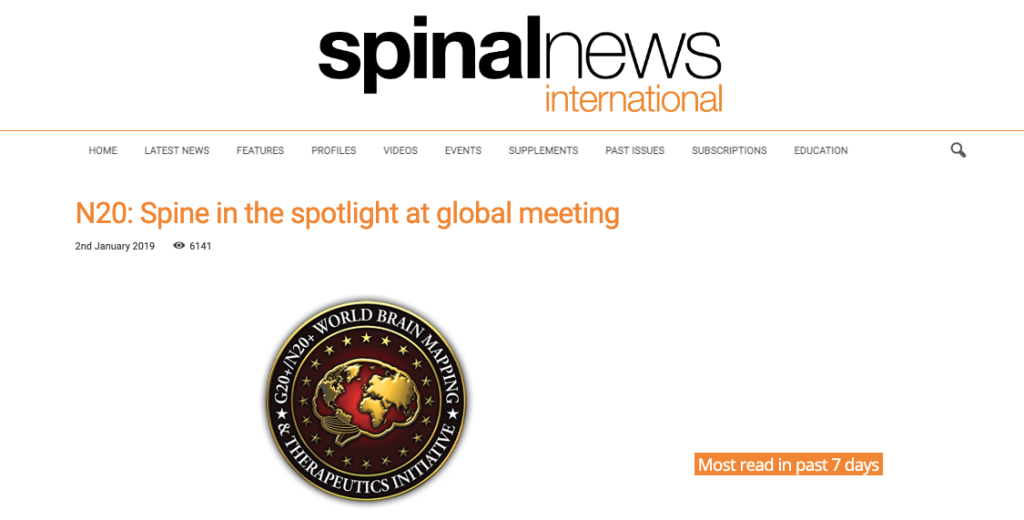
The Society for Brain Mapping and Therapeutics (SBMT) and the Brain Mapping Foundation (BMF) recently hosted their 5th Annual Neuroscience-20 event in Buenos Aires, Argentina (N20; 26–27 November). For the past five years the goal has been to get neuroscience treatments and innovation on the radar for the G20 meeting, the main international forum for economic, financial and political cooperation. Presently, the global economic burden of brain, spine, and other nervous system disorders amounts to over US$13 trillion annually. Organisers of the N20 believe that if G20 nations understand the immense scope of neuroscience-related disability issues facing the globe, they can work together to find treatments and fund innovative research, including spine research. In 2014, the first N20 meeting was held in Australia and over the last five years the group’s aims have been clarified. This year, the North American Spine Society (NASS) was involved for the first time, bringing spinal issues into focus. Key talks on spine covered numerous topics, ranging from spinal care in a global context and its associated costs, to technological advances, such as navigation, robotics, and 3D virtual planning. The programme this year also featured thought leaders in neuroscience from the EU, USA, Argentina, Chile, Brazil, and Turkey. At the end of the two-day meeting, Babak Kateb, founding chairman of the board and CEO of SMBT, and Alejandro Mercado, president of N20-Argentina, presented the group’s neuroscience recommendations to ministers, ambassadors and VIPs of the G20 nations. Jeffrey Wang, NASS president and president of SMBT, is committed to a global approach to spine care. “It is important to be organised on an international level,” he told Spinal News International. “The incidence of spine disability is increasing and to address this we need to raise awareness and pool resources,” he continued. He noted the importance of getting “everyone at the table” and ensuring there was a focus on preventive, non-operative measures as well as developments in spinal surgery. He stressed that “tangible projects” will be the way to achieve the ambitious yet necessary goals of the N20. Kateb has been heavily involved in global neuroscience legislation and policy for several years. He has chaired seven Brain Mapping Day briefings on the latest innovation in brain and spine diagnostics, therapeutics and policy as well as topics related to the wounded soldiers and veterans with neurological disorders at the US Congress and organised several brain mapping days at the Canadian and Australian Parliaments in 2012 and 2016, respectively. He was also one of the key players in President Obama’s BRAIN initiative. Speaking exclusively to Spinal News International, Kateb says we need need “robust global partnerships” in order to “push innovation and reduce the costs of healthcare”. He believes progress is being made, however gradually, and that an increased emphasis on spinal care is a positive step forward. The N20 group plan to publish the recommendations it made at this year’s summit in high impact scientific journals, publicising findings and recommendations through a series of press releases. Some of their specific aims for this year were to account for the global economic burden of diseases and injuries of the brain, spine, retina, and peripheral nervous system, promote a whole-of-government approach to address brain and spine disease and injury (BSDI), and to fund the responsible application of technologies associated with the digital transformation for brain and spine research and clinical treatment. Their recommendations included encouraging the funding of studies analysing the economic burden of neurological, psychiatric and spinal disorders, and more importantly, the establishment of an international data repository, encouraging investment and global networking, initiating preventive programmes, improving technologies and creating global regulations and guidelines. The next N20 meeting is set to take place 27–28 June 2019 in Osaka, Japan.
BATTLING GLOBAL BURDEN OF BRAIN AND SPINE DISORDERS THROUGH TECHNOLOGY, INNOVATION, LOW COST APPROACHES AND BETTER POLICY
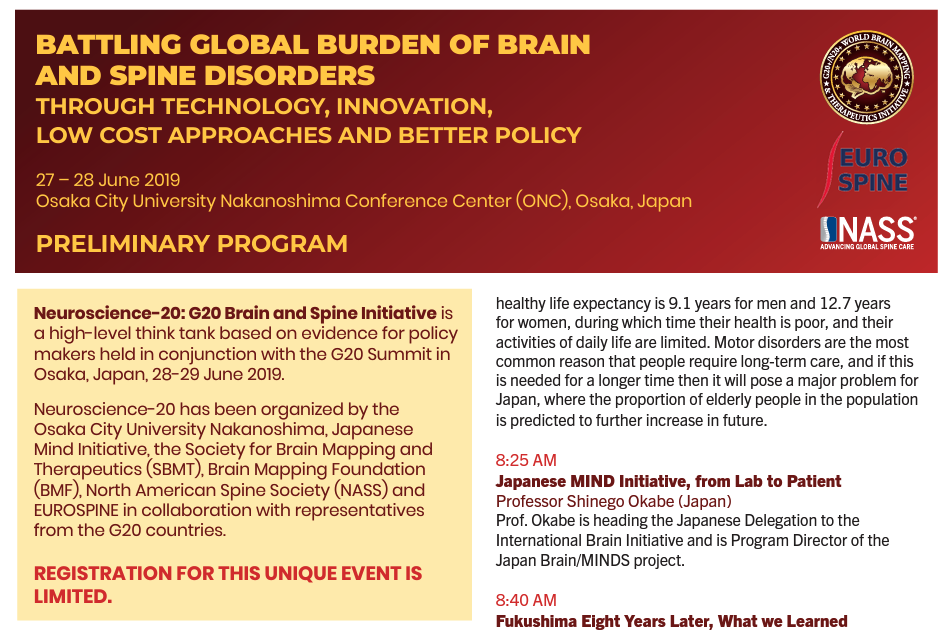
Neuroscience-20: G20 Brain and Spine Initiative is a high-level think tank based on evidence for policy makers held in conjunction with the G20 Summit in Osaka, Japan, 28-29 June 2019. Neuroscience-20 has been organized by the Osaka City University Nakanoshima, Japanese Mind Initiative, the Society for Brain Mapping and Therapeutics (SBMT), Brain Mapping Foundation (BMF), North American Spine Society (NASS) and EUROSPINE in collaboration with representatives from the G20 countries. REGISTRATION FOR THIS UNIQUE EVENT IS LIMITED. healthy life expectancy is 9.1 years for men and 12.7 years for women, during which time their health is poor, and their activities of daily life are limited. Motor disorders are the most common reason that people require long-term care, and if this is needed for a longer time then it will pose a major problem for Japan, where the proportion of elderly people in the population is predicted to further increase in future. 8:25 AM Japanese MIND Initiative, from Lab to Patient Professor Shinego Okabe (Japan) Prof. Okabe is heading the Japanese Delegation to the International Brain Initiative and is Program Director of the Japan Brain/MINDS project. 8:40 AM Fukushima Eight Years Later, What we Learned Professor Shinichi Kikuchi (Japan) Dr. Kikuchi is with Fukushima Medical University (Fukushima, Japan). The Fukushima disaster shook Japan and the world. What can we learn from it? What are the implications for policy? We get the unique opportunity to hear the perspective and experience of Dr Kikuchi, who led the medical response 8:55 AM Discussion Battling Disability Moderator: Margareta Nordin, Dr. Med. Sci., PT 9:05 AM Economic Development and the Burden of Disease David Lipton and Mitsuhiro Furuawa, International Monetary Fund (USA) The economic burden of brain, spine, and CNS diseases may be vastly underestimated, as are eff ects on productivity and other economic and human development factors. AGENDA Thursday 27 June 2019 7:00 AM Welcome Coff ee & Registration Master of Ceremony: Chris Ebell, VP of Neuroscience-20 and Member of the Board of SBMT 8:00 AM Welcome and Opening Address Professor Hiroaki Nakamura (Japan), Professor Shigeo Okabe (Japan), Professor Babak Kateb (USA) Insights from Japan Moderator: Babak Kateb, MD 8:15 AM Local Host Welcome Professor Hiroaki Nakamura (Japan) “Faith Will Move Mountains: Extending Healthy Life Expectancy.” The mean life expectancy in Japan is now 80.75 years for men and 86.99 years for women, longer than ever before. However, the divergence between this fi gure and 9:20 AM Unraveling Disability Related to Spine Disorders and Mental Health Pierre Côté (Canada) Spinal disorders and mental health disorders are the two leading causes of disability worldwide. Despite large societal investments in the treatment of musculoskeletal pain and mental health disorders, the prevalence of resulting disabilities, continues to grow significantly. One reason for this epidemic is that musculoskeletal pain and mental health disorders often coexist in individuals, yet research has not considered their shared etiology and prognosis. Dr. Côté will explore the epidemiology of disability related to these conditions and propose a novel approach to conceptualizing disability related to spine and mental health disorders and discuss the development of prevention and rehabilitation interventions for disability. 9:35 AM Implementation of the Disability Action Plan Worldwide 2014 – 2021 Tarun Dua (Switzerland) WHO’s data and evidence-driven approach to global health policy provides an authoritative view on the prevention, costs, and effects of CNS disease. For the G20, their focus is on dementia on which WHO just published a new report. 9:50 AM Spine Care, Prevention and Treatment Options: Why We Should Pay Attention to the Human and Financial Costs Hani Mhadli (Spain) Policy recommendations for the globe must be inclusive and consider the experience of all geographies. Dr Mhadli shares the South-American perspective as the President-elect of the Association of Iberian and Latin American Spine Societies (SILACO) and the Head of Spine Service at the University Hospital las Palmas de Gran Canaria, Spain. 10:00 AM Discussion 10:10 AM Coffee Break Innovation Moderator: Daniel Sipple, DO, FABPMR, DABPM 10:30 AM New Frontiers in Cellular Therapeutics-based Diagnostics and Therapeutics for Alzheimer’s Disease Kuldip Sidhu (Australia) and Robert Hariri (USA) Dementia that encompasses Alzheimer’s and Parkinson’s diseases is a global issue and currently there are more than 46.8 million worldwide and over 342, 800 Australians suffering with this disease. With no cure so far, the projection is that this number will be double by 2030 and more than triple by 2050. Dementia is the third major cause of death after heart disease and stroke. There is a huge economic impact, currently Australia is spending more than 4.9 billion and 1 trillion dollars worldwide to maintain these patients. There is a latency of 10-15 years before symptoms of Alzheimer’s appear. With the advent of induced pluripotent technology stem cells technology, we can reproduce the disease in the Patri dish and hence can thus turn the clock back on these disease from number of years to few weeks. This new frontier is paving the way to diagnose and effectively tackle this disease, reducing burden and improving lives. 10:40 AM The Future of Spine Care from Technology to Global Spine Policy Jeffrey Wang (USA) As every aspect of care evolves it is crucial for policymakers to scan the horizon and see how clinical intervention and prevention will look like in the next decade. As one of the foremost spine doctors in America, Dr Wang will bring his insight and experience as a practitioner to the roundtables for brain and spine disorders as well as introducing a resolution on how the G20 nations should synchronize clinical protocols and data sharing on newly developed technologies and innovation. 10:50 AM Pain, Motor Control and the Effect of Therapeutic Exercise Paul Hodges (Australia) Contemporary therapeutic exercise for musculoskeletal conditions relies on findings from neuroscience (including neuroscience of pain and movement), biomechanics, muscle physiology and immune system function. The interaction between these diverse fields is helping explain the observations of people in pain and is leading to improved outcomes. The challenge is to harness the opportunity the reduced massive burden of
Brain Mapping Foundation (BMF) Announces its 2019 Award Recipients including Dr. Deepak Chopra, Senator Kamala Harris and Renowned Filmmaker, Sean Stone
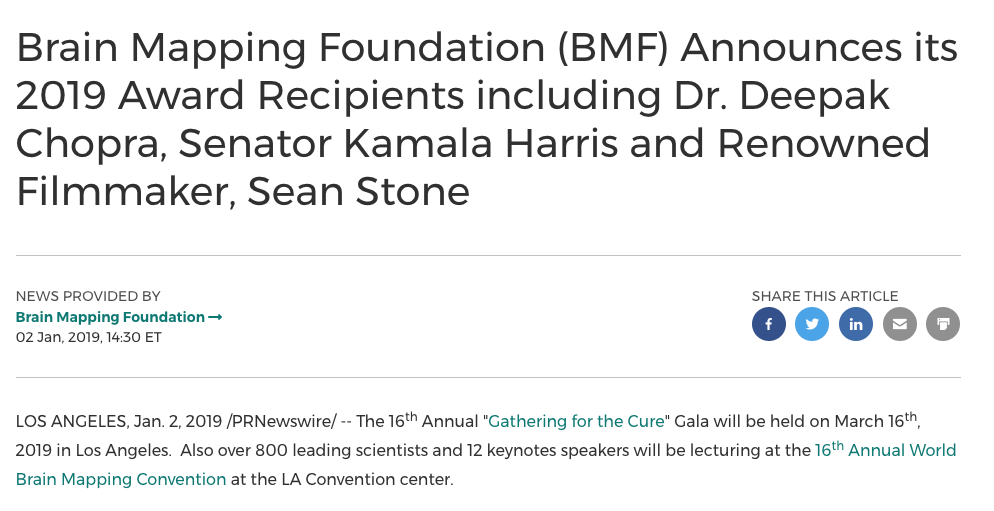
LOS ANGELES, Jan. 2, 2019 /PRNewswire/ — The 16th Annual “Gathering for the Cure” Gala will be held on March 16th, 2019 in Los Angeles. Also over 800 leading scientists and 12 keynotes speakers will be lecturing at the 16th Annual World Brain Mapping Convention at the LA Convention center. BMF has been on the forefront of wounded warrior care and treatments for civilians with neurological disorders by bringing scientists, physicians and engineers across multiple disciplines in its annual conventions and by forming lifesaving multidisciplinary clinical trials. Annually the organization awards pioneers and leaders in the field as well as humanitarians and philanthropists. Dr. Deepak Chopra, who will be the recipient of the 2019 Humanitarian award for his global humanitarian and philanthropic work, said, “I’m truly honored to be receiving this award, we are living in the golden age of neuroscience. There is no experience that cannot be mapped in the brain. As we better understand the neural correlations of mind consciousness, behavioral genetics and epigenetics; we shall not only be preventing and treating disease with targeted revision, but also unfolding the full range of human potential.” 2019 recipients of the Golden Axon leadership award are Drs. Jeff Wang, Harry Kloor, Nevzat Tarhan, Actor, Director and Producer Sean Stone and Producer Billie Feldman for their role in raising awareness about the foundation and its mission through strategic programs, global collaboration and partnerships. “‘It’s a tremendous honor to be considered for this award as I am in awe of the work Dr. Kateb and other neuroscientists are doing through the urgently needed Brain Mapping Foundation. Their work will help determine the outcome of humanity in the coming century,” said Sean Stone. Dr. Katrin Amunts will be the recipient of the Pioneer in Medicine award for her role as scientific director of the European Human Brain Project and for developing a 3D atlas of the human brain. California Senator Kamala Harris is the recipient of the Pioneer in Healthcare Policy award for her legislations in support for healthcare and medical research. The Beacon of Courage and Dedication award, which is aimed at patients and their families who have shown great courage in fighting neurological disorders will be presented to renowned producer and director Bobak Kalhor and Ms. Saayeh Sarmast (a ALS research advocate). Finally, the Pioneer in Technology Development Award will be presented to The French Muscular Dystrophy (AFM) Telethon for their tireless effort in introducing lifesaving drugs, which have saved thousands of lives of patients with muscular dystrophy. For more information about donating to the organization and or purchasing the ticket for the 16th Annual Gathering for the Cure gala please visit the organization’s official website: www.WorldBrainMapping.Org or Contact Ms. Breanna Marquez. Media Contact:Breanna Marquez,Director of Media MarketingSociety for Brain Mapping and Therapeutics (SBMT)Cell: 310-270-7458Email: breanna.marquez@worldbrainmapping.org SOURCE Brain Mapping Foundation Related Links http://www.WorldBrainMapping.Org
MEGIN CEO Speaks at Neuroscience-20 World Brain Mapping Summit in Argentina
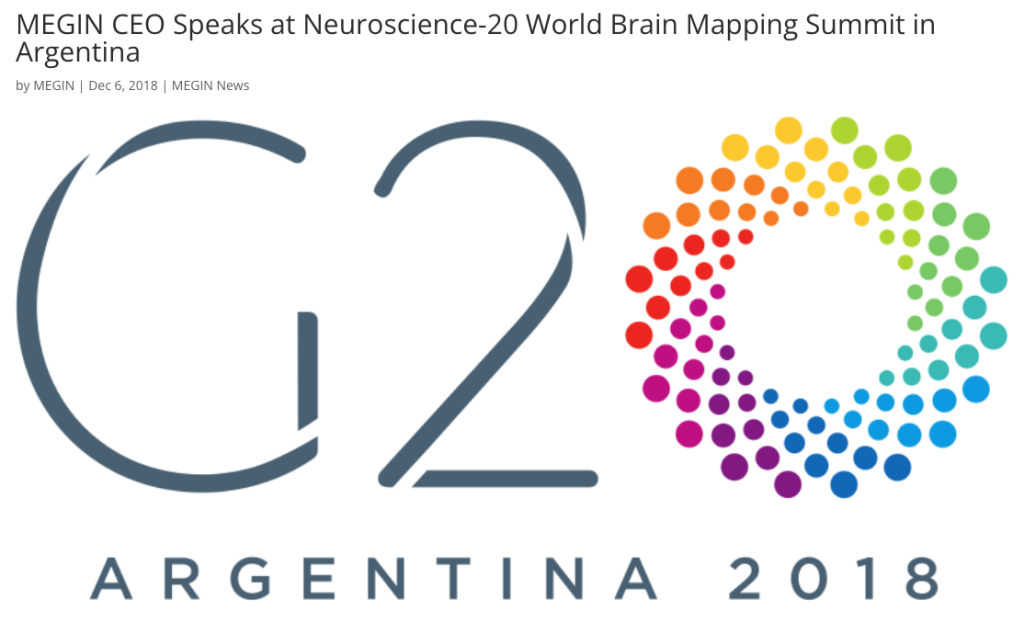
MEGIN CEO Speaks at Neuroscience-20 World Brain Mapping Summit in Argentina BUENOS AIRES, Argentina, Dec. 6, 2018 — Janne Huhtala, CEO of MEGIN, a manufacturer of magnetoencephalography (MEG) technology for functional brain imaging, spoke about the future innovation of MEG technology during the Fifth Annual G20 World Brain Mapping Summit/Neuroscience 20. The N20, held on November 26-27, in Buenos Aries, Argentina, brought together leading specialists, directors of International Brain Initiatives and medical associations presidents, to discuss the global economic impact of neurological disorders and build greater collaboration in fields related to epilepsy, mental health, neuro-oncology, neurotrauma, spine and neurosurgery. N20 leaders published resolution 27112018 with consensus recommendations that will address the economic burden of brain, spine and other nervous system disorders that amount to over $13 Trillion USD annually by introducing game-changing diagnostics and therapeutics such as MEG. During the N20 summit, Huhtala addressed how the use of functional brain imaging with MEG has impacted patient care and led to translational research of challenging neurological conditions. He explained that through understanding brain connectivity, there is the potential for the clinical community to develop new methods of improving the diagnosis, treatment and rehabilitation of diseases. “It was an honor to present to a room of esteemed leaders in neuroscience community from around the world,” said Huhtala. “The focus of the conference aligns with our corporate goals of innovating MEG technology and we look forward to supporting the clinical community in search of ways to better understand how the brain is connected.” “MEG is a great technology that has been neglected for years,” said Dr. Babak Kateb, Global President and Chairman of Neuroscience-20 (N20), Chairman of the board and CEO of Society for Brain Mapping and Therapeutics (SBMT), President of Brain Mapping Foundation, Director of National Center for NanoBioElectronic (NCNBE) and Director of Brain Technology and Innovation Park (BTIP). “Our patients have been deprived of access to this technology for decades. It is refreshing to see MEGIN has a convincing strategic plan to make this technology as prevalent and accessible as MRI. This could not have been possible without the visionary leadership of Mr. Janne Huhtala who has a track record in neurotech innovation, clearly understands the technology/field and has a passion to help millions of patients through cutting-edge technology. This is a great example of how N20 could bring advanced therapeutics and diagnostics to the millions of patients through global collaborations,” said Kateb. About MEGIN Based in Helsinki, Finland, MEGIN has been the largest provider of MEG technology for functional brain imaging. TRUIX™ neo, launched in 2018, is the fourth-generation system introduced for the presurgical evaluation of epilepsy, brain tumors, or other lesions, and surgical planning for localization of sensory information. With a dynamic view of the human brain, TRIUX neo is a non-invasive, real-time, patient-specific view of neural activity with millimeter accuracy and millisecond resolution.
DR. ZELINSKY ADDRESSED N20 WORLD SUMMIT
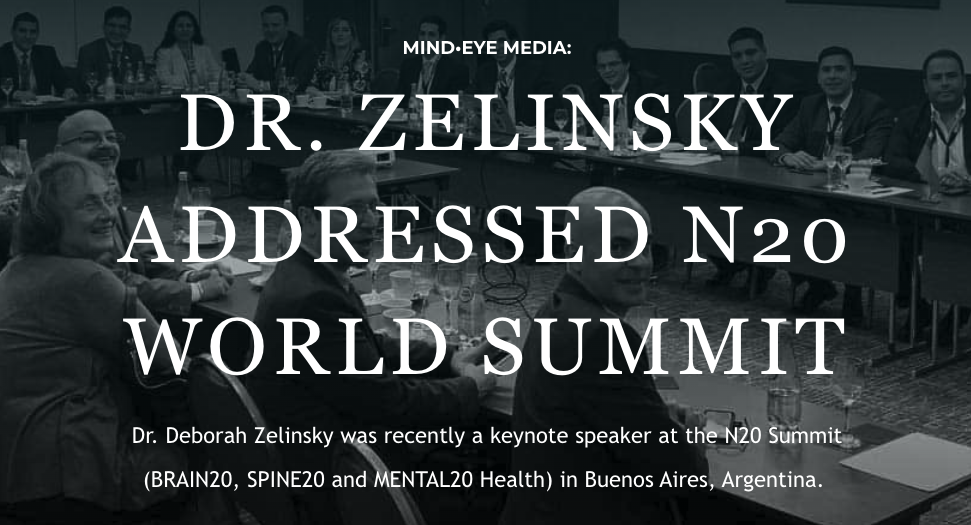
How the Mind•Eye Connection Affects Mental Health Internationally noted for her work on the retina and its impact on brain function, physiology, and mental health, Dr. Zelinsky is the first optometrist ever invited to address the prestigious N20 World Brain Mapping & Therapeutic Neuroscience Summit (BRAIN20, SPINE20 and MENTAL20 Health). Dr. Zelinsky recently was a keynote speaker at the N20 Conference (BRAIN20, SPINE20 and MENTAL20 Health) in Buenos Aires, Argentina. There, she spoke to leading neuroscientists and neurosurgeons from around the world about how eye care must evolve from the 20th-century model in order to help more people. The N20 Summit passed Dr. Zelinsky’s policy recommendations along to the G20 Summit of world leaders on November 30, 2018, where they were accepted and will eventually be implemented. The N20 Summit (BRAIN20, SPINE20 and MENTAL20 Health) was launched in 2014 as a project of the Society for Brain Mapping and Therapeutics. The S.B.M.T. is aligned with the National Institutes of Health’s BRAIN Initiative – to revolutionize understanding of the human brain and accelerate the development of new technologies that will more effectively treat neurological disorders. Learn more about the NIH here. Typical Eye Testing May Not Thoroughly Assess Sensory Overload 01Make The ConnectionThe traditional practice of using eyeglasses simply to give a patient clearer, 20/20 eyesight is outdated. Current scientific knowledge presents the opportunity for prescription eyeglasses to be selectively designed to alter sensory integration, including auditory function and body biochemistry, and affect learning disabilities, autism, symptoms of concussion and many other neurological impairments. 02Changing PerspectivesMental health disorders have reached a crisis level in the world, including the United States, and are as much related to retinal sensitivities in peripheral eyesight and lack of integration between visual and auditory signals, as they are to abnormal brain activity and neurochemical imbalances. Just as changes in environmental stimuli can impact brain function and biochemistry, so, too, eyeglasses can modify environmental input to the retina and mitigate neurological issues. 03Skillness vs IllnessPolicy changes regarding screening for proper connections between eyes and ears could allow health professionals to intervene in this public health care crisis by preventing or at least reducing various mental health issues, thereby enhancing the quality of citizens’ lives (young and old), promoting better productivity of citizens, and potentially reducing health care costs by millions of dollars worldwide. “The retina serves as a two-way portal into the mind and body,” says Dr. Zelinsky, a fellow in both the College of Optometrists in Vision Development and the Neuro-Optometric Rehabilitation Association, a member of the Society for Brain Mapping and a community leader for the Society of Neuroscience. “The way light enters the retina impacts brain function, affects various nervous systems and alters body biochemistry. We have the knowledge to affect the mind and body in positive ways. “As eye care professionals, we can have a positive impact on cognitive impairments using prescriptive eyeglasses that modify the retina’s perception of light,” she says. Dr. Zelinsky developed the Z-Bell Test℠, a simple but revolutionary method of checking a patient’s overall awareness of space and his or her integration of visual processing with listening. The test has changed the lives of both pediatric and adult patients.“With the Z-Bell Test℠, we can determine whether the environment is in sync or just plain confusing for a patient,” she explains. “Using the proper mix of filters, lenses and/or prisms, we can readjust a patient’s visual balance and eye-ear integration by altering the way in which light disperses across the retina. Changes in luminance on the eye affect how the brain interprets and reacts to information about the environment and can impact a person’s spatial awareness, body movement and selective attention to sound.”Dr. Zelinsky’s groundbreaking work in assessing brain function, with an emphasis on the linkage between eyes and ears, is described in the recently published book The Ghost in My Brain: How a Concussion Stole My Life and How the New Science of Brain Plasticity Helped Me Get It Back. The book was written by one of her former, recovered patients, Clark Elliott, PhD.
Üsküdar University attended G20 5. Brain Initiative and Neuroscience Summit
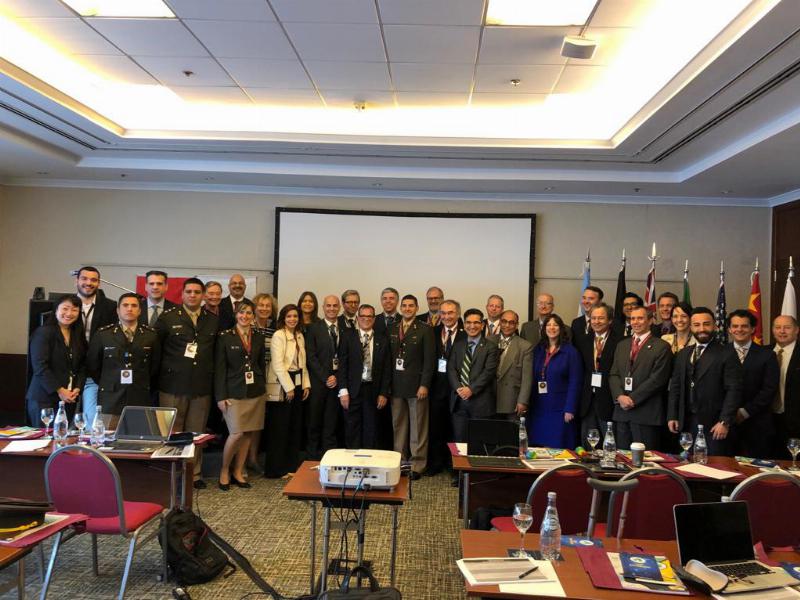
Üsküdar University attended the G20 summit N20/Neuroscience20 (BRAIN20, SPINE20, MENTAL20 Health) Initiative held at Buenos Aires, Argentine on November 26 and 27, 2018. The scientists who conduct brain research activities got together at the Summit supported by Üsküdar University. 5. G20 summit N20/Neuroscience20 (BRAIN20, SPINE20, MENTAL20 Health) Initiative, organized within the scope of cooperation studies on Brain Mapping, was held in Argentina on 26 – 27 November 2018. The scientists who conduct brain research activities got together at the Summit supported by Üsküdar University. Issues such as “reducing health costs, achieving effective results through innovation, and monitoring of neurotechnological developments” were discussed this year in the event that was organized in cooperation between Üsküdar University, Brain Mapping and Therapeutic Association (SBMT), IBM, Mind and Eye Institute (Mind Eye Institute) and G20 summit N20/Neuroscience20 (BRAIN20, SPINE20, MENTAL20 Health) Initiative. The only university attended the Summit from Turkey: Üsküdar University Besides the representatives from Argentina, representatives, and leaders from Turkey, Australia, Japan, Canada, Germany, Brazil, USA, South Africa, France, Italy, Saudi Arabia, India, Indonesia, China, Mexico, Russia, European Union, South Korea, and United Kingdom also attended the G20 Neuroscience Summit. Üsküdar University President Prof. Nevzat Tarhan and Human Resources Director, Faculty Member Serdar Karagöz represented Turkey at the Summit. Prof. Tarhan delivered a presentation about “Neurotechnology Using in Psychiatric Treatment”. Studies on neuroscience are carried out It was aimed at the G20 summit N20/Neuroscience20 (BRAIN20, SPINE20, MENTAL20 Health) Initiative to discuss new diagnostic and therapeutic methods for patients with neuro-psychiatric and spinal disorders and make global consensus and partnerships on brain and spine health initiatives. Only Turkish university to represent and attend at the Summit Üsküdar University was the only university to attend and represent Turkey at the G20 summit N20/Neuroscience20 (BRAIN20, SPINE20, MENTAL20 Health) Initiative held on November 2015 at Antalya. Üsküdar University has also attended the G20 summit N20/Neuroscience20 (BRAIN20, SPINE20, MENTAL20 Health) Initiative at China in 2016 and at Germany in 2017. It was aimed to gather scientists, engineers, and physicians together in order to contribute to the Brain Initiative initiated by former US President Obama and increase the actions related to initiatives in G20 countries. Clinical solutions for neurological disorders costing 100 billion dollars each year to the world economy were discussed within the scope of the summit. Turkish Representative at Brain Initiatives Project Üsküdar University carries out the representation and project partnership of the Brain Initiative Project initiated by the former US President Barack Obama in 2013. A number of studies have been performed to this day within the scope of the project, which aims to solve the unknown secrets of the brain, investigate and develop the treatment of important brain diseases such as autism, schizophrenia, Parkinson’s and Alzheimer’s. Üsküdar News Agency (ÜNA)
MEGIN CEO Janne Huhtala Speaks At Neuroscience-20 (N20)/G20 World Brain Mapping Summit
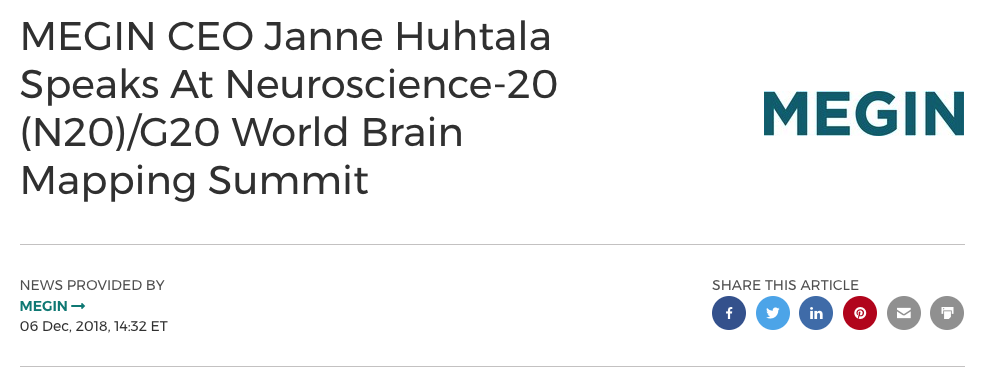
BUENOS ARIES, Argentina, Dec. 6, 2018 /PRNewswire/ — Janne Huhtala, CEO of MEGIN, a manufacturer of magnetoencephalography (MEG) technology for functional brain imaging, spoke about the future innovation of MEG technology during the Fifth Annual G20 World Brain Mapping Summit/Neuroscience 20. The N20, held on November 26-27, in Buenos Aries, Argentina, brought together leading specialists, directors of International Brain Initiatives and medical associations presidents, to discuss the global economic impact of neurological disorders and build greater collaboration in fields related to epilepsy, mental health, neuro-oncology, neurotrauma, spine and neurosurgery. N20 leaders published resolution 27112018 with consensus recommendations that will address the economic burden of brain, spine and other nervous system disorders that amount to over $13 Trillion USD annually by introducing game-changing diagnostics and therapeutics such as MEG. During the N20 summit, Huhtala addressed how the use of functional brain imaging with MEG has impacted patient care and led to translational research of challenging neurological conditions. He explained that through understanding brain connectivity, there is the potential for the clinical community to develop new methods of improving the diagnosis, treatment and rehabilitation of diseases. “It was an honor to present to a room of esteemed leaders in neuroscience community from around the world,” said Huhtala. “The focus of the conference aligns with our corporate goals of innovating MEG technology and we look forward to supporting the clinical community in search of ways to better understand how the brain is connected.” “MEG is a great technology that has been neglected for years,” said Dr. Babak Kateb, Global President and Chairman of Neuroscience-20 (N20), Chairman of the board and CEO of Society for Brain Mapping and Therapeutics (SBMT), President of Brain Mapping Foundation, Director of National Center for NanoBioElectronic (NCNBE) and Director of Brain Technology and Innovation Park (BTIP). “Our patients have been deprived access to this technology for decades. It is refreshing to see MEGIN has a convincing strategic plan to make this technology as prevalent and accessible as MRI. This could not have been possible without the visionary leadership of Mr. Janne Huhtala who has track record in neurotech innovation, clearly understands the technology/field and has a passion to help millions of patients through cutting-edge technology. This is a great example of how N20 could bring advanced therapeutics and diagnostics to the millions of patients through global collaborations,” said Kateb. About MEGIN In July 2018, York Instruments, a subsidiary of Croton Healthcare, acquired MEGIN from Elekta, forming a neurosciences technology company focused on developing innovative solutions in functional brain imaging. Based in Helsinki, Finland, MEGIN has been the largest provider of MEG technology for functional brain imaging. TRUIX™ neo, launched in 2018, is the fourth-generation system introduced for the presurgical evaluation of epilepsy, brain tumors, or other lesions, and surgical planning for localization of sensory information. With a dynamic view of the human brain, TRIUX neo is a non-invasive, real time, patient specific view of neural activity with millimeter accuracy and millisecond resolution. For further information, please contact: For MEGIN:Tyler LecceadoneSeyferthPR616-776-3511lecceadone@seyferthpr.com SOURCE MEGIN
En el marco del G20, se realizará un encuentro de neurociencias
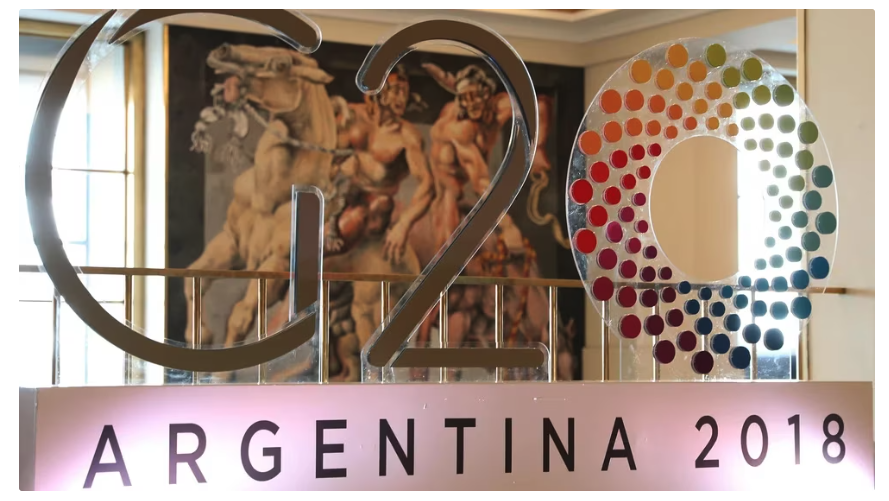
Será el lunes y el martes en el hotel Hilton En el marco de la realización de la cumbre del G20 en la ciudad de Buenos Aires, en el hotel Hilton se llevará adelante una nueva edición del Neuroscience 20, un evento que se propone analizar el impacto económico que tienen las enfermedades del sistema nervioso. En total, se realizarán siete paneles de discusión en los que participarán distintos expertos del área de variadas nacionalidades. Además, habrá charlas y presentaciones de reconocidos profesionales. El lunes 26 se tratarán temas en cuatro paneles como la salud mental en general, la epilepsia, las enfermedades cardiovasculares y los desórdenes neurodegenerativos de la columna vertebral. El martes 27 los paneles de discusión girarán en torno a la neurooncología, las innovaciones en la neurocirugía y los traumas en el cerebro y la columna vertebral. En ese sentido, el presidente del comité local de Expertos del evento, Alejandro Mercado Santori, aseguró que las jornadas están basadas “específicamente en la esfera de las Neurociencias, y apuntado al análisis regional y global, tanto de la incidencia como así también del impacto económico que cada una de las enfermedades del sistema nervioso tienen en la población local y mundial”. “Estarán presentes neurocientíficos de gran prestigio y renombre, tanto del ámbito de la Neurología y Neurocirugía argentina, así como de distintas partes del mundo (Estados Unidos, Australia, Francia, Alemania, Brasil, Chile, México, India, entre otros), contando también con la presencia de investigadores internacionales del ámbito de la bio-ingeniería y de las telecomunicaciones”, agregó Mercado Santori. En esa línea, concluyó: “Esperamos acrecentar la estrecha relación entre ciencia, tecnología y política sanitaria. Creemos que es una oportunidad única para nuestro país, la cual no debemos dejar pasar por alto. Los ojos del mundo van a estar puestos en esta cumbre del G20″.
In the framework of the G20, a neurosciences meeting will be held
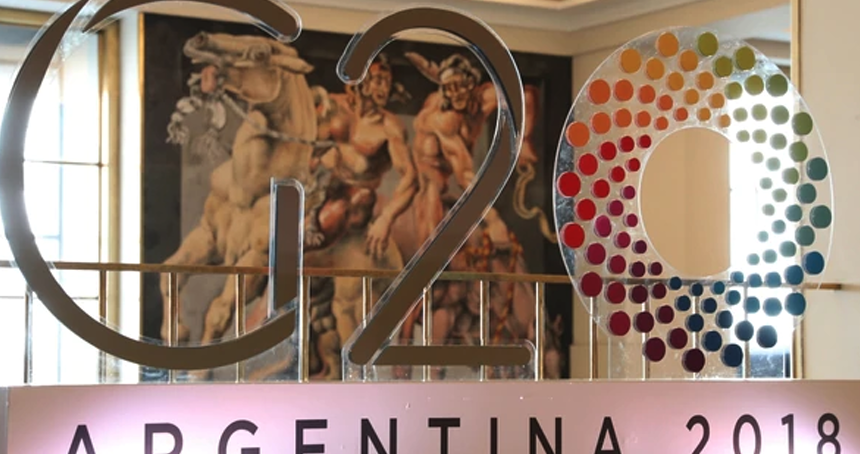
The G20, or Group of 20, is the main international forum for economic, financial and political cooperation En el marco de la realización de la cumbre del G20 en la ciudad de Buenos Aires, en el hotel Hilton se llevará adelante una nueva edición del Neuroscience 20, un evento que se propone analizar el impacto económico que tienen las enfermedades del sistema nervioso. En total, se realizarán siete paneles de discusión en los que participarán distintos expertos del área de variadas nacionalidades. Además, habrá charlas y presentaciones de reconocidos profesionales. El lunes 26 se tratarán temas en cuatro paneles como la salud mental en general, la epilepsia, las enfermedades cardiovasculares y los desórdenes neurodegenerativos de la columna vertebral. El martes 27 los paneles de discusión girarán en torno a la neurooncología, las innovaciones en la neurocirugía y los traumas en el cerebro y la columna vertebral. En ese sentido, el presidente del comité local de Expertos del evento, Alejandro Mercado Santori, aseguró que las jornadas están basadas “específicamente en la esfera de las Neurociencias, y apuntado al análisis regional y global, tanto de la incidencia como así también del impacto económico que cada una de las enfermedades del sistema nervioso tienen en la población local y mundial”. “Estarán presentes neurocientíficos de gran prestigio y renombre, tanto del ámbito de la Neurología y Neurocirugía argentina, así como de distintas partes del mundo (Estados Unidos, Australia, Francia, Alemania, Brasil, Chile, México, India, entre otros), contando también con la presencia de investigadores internacionales del ámbito de la bio-ingeniería y de las telecomunicaciones”, agregó Mercado Santori. En esa línea, concluyó: “Esperamos acrecentar la estrecha relación entre ciencia, tecnología y política sanitaria. Creemos que es una oportunidad única para nuestro país, la cual no debemos dejar pasar por alto. Los ojos del mundo van a estar puestos en esta cumbre del G20″.
